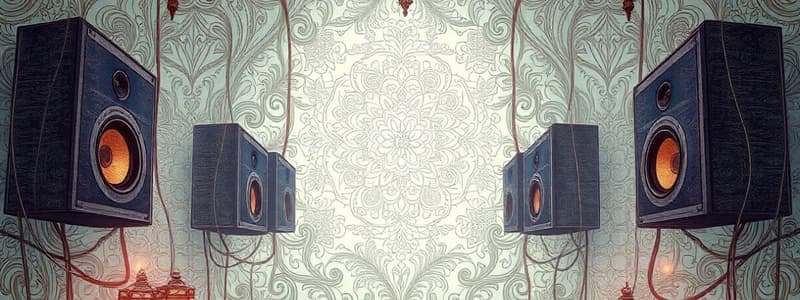Podcast
Questions and Answers
What do gas sensors primarily monitor?
What do gas sensors primarily monitor?
- Sound frequencies
- Temperature changes in the environment
- Oxygen and carbon dioxide levels (correct)
- Magnetic field variations
Which application of an accelerometer is correct?
Which application of an accelerometer is correct?
- Measuring temperature changes in a device
- Measuring sound pressure levels
- Detecting rapid deceleration in cars (correct)
- Detecting liquid levels in a tank
What does a moisture sensor measure?
What does a moisture sensor measure?
- The humidity of the air
- The temperature of the air
- The water levels in soil (correct)
- The amount of light in a greenhouse
Which sensor detects changes in humidity levels?
Which sensor detects changes in humidity levels?
Which type of sensor would you use to monitor pollution levels in the air?
Which type of sensor would you use to monitor pollution levels in the air?
Proximity sensors are primarily used to detect what?
Proximity sensors are primarily used to detect what?
What is the primary function of a light sensor?
What is the primary function of a light sensor?
How does an infrared (active) sensor operate?
How does an infrared (active) sensor operate?
What function do flow sensors serve?
What function do flow sensors serve?
What does a passive infrared sensor detect?
What does a passive infrared sensor detect?
What is the main function of magnetic field sensors?
What is the main function of magnetic field sensors?
What type of signals do acoustic sensors convert?
What type of signals do acoustic sensors convert?
For what purpose might a pressure sensor be used?
For what purpose might a pressure sensor be used?
What characteristic differentiates humidity measurement from moisture measurement?
What characteristic differentiates humidity measurement from moisture measurement?
Which sensor is utilized to control acidity levels in soil?
Which sensor is utilized to control acidity levels in soil?
In what application would a humidity sensor be most appropriately used?
In what application would a humidity sensor be most appropriately used?
What is the function of a digital to analogue converter (DAC) in relation to speakers?
What is the function of a digital to analogue converter (DAC) in relation to speakers?
What role do sensors play in a system that controls a process?
What role do sensors play in a system that controls a process?
Which of the following best describes how speakers produce sound?
Which of the following best describes how speakers produce sound?
In what scenario would an analogue to digital converter (ADC) be used?
In what scenario would an analogue to digital converter (ADC) be used?
What happens when sensor readings indicate a parameter is out of range in a control system?
What happens when sensor readings indicate a parameter is out of range in a control system?
Which type of signal do sensors typically send to a microprocessor?
Which type of signal do sensors typically send to a microprocessor?
What common application might use a temperature sensor?
What common application might use a temperature sensor?
What component in a speaker is primarily responsible for producing sound through vibration?
What component in a speaker is primarily responsible for producing sound through vibration?
Flashcards are hidden until you start studying
Study Notes
Speakers
- Speakers convert electrical signals into sound waves.
- Digital signals need to be converted to analog signals using a Digital-to-Analog Converter (DAC) before they can drive speakers.
- Speakers consist of a cone made of paper or plastic, a permanent magnet, and a coil of wire wrapped around an iron core.
- Varying electric currents cause the iron core to vibrate, which in turn vibrates the cone, producing sound.
Sensors
- Sensors are input devices that detect physical properties like temperature, light, or pressure.
- Sensors constantly send signals to microprocessors or computers.
- Sensor signals are typically converted to digital data using an Analog-to-Digital Converter (ADC) since computers only understand binary data.
- When monitoring a process, sensors compare their readings to stored data, triggering alerts if the values are out of range (e.g., patient vital signs, intruder alarms, pollution levels).
- When controlling a process, sensor data is compared to set values, and actuators are activated to adjust the process when necessary (e.g., turning on heaters, opening valves). This is known as feedback.
- Control data from the computer is often converted to analog signals via a DAC to operate actuators.
Types of Sensors
- Temperature: Measures temperature and sends signals that vary with changes in temperature. Applications include controlling heating systems, monitoring chemical processes, and regulating temperatures in greenhouses.
- Moisture: Measures water levels, often based on the electrical resistance of the sample. Applications include monitoring soil moisture, food processing factories, and controlling greenhouse moisture levels.
- Humidity: Measures water vapor in the air, based on conductivity changes. Applications include monitoring building humidity, factory humidity, and controlling air humidity in greenhouses.
- Light: Uses photoelectric cells to generate electric currents proportional to light brightness. Applications include turning streetlights on/off based on light levels and automatically activating car headlights.
- Infrared (Active): Detects changes in infrared radiation when a beam is interrupted. Applications include automatic windscreen wipers, security alarm systems, and detecting object movement.
- Infrared (Passive): Measures heat radiation emitted by objects. Applications include security alarm systems, monitoring fridge temperatures, and industrial freezers.
- Pressure: Transducers that generate different electrical currents based on applied pressure. Applications include weighing lorries, measuring gas pressure in nuclear reactors.
- Acoustic/Sound: Microphones that convert sound into electrical signals/pulses. Applications include security systems to detect footsteps, faulty pipes, and other sounds.
- Gas: Detects specific gases such as oxygen or carbon dioxide. Applications include monitoring air pollution, greenhouse gas levels, and car exhaust emissions.
- pH: Measures changes in voltage based on the acidity of the soil. Applications include monitoring and controlling soil acidity and chemical processes.
- Magnetic Field: Measures changes in magnetic fields, providing an output that varies with the changes. Applications include detecting magnetic field changes in mobile phones, CD players, and anti-lock braking systems.
- Accelerometer: Measures acceleration and motion by detecting changes in velocity. Applications include car crash detection, airbag deployment, and mobile phone orientation detection.
- Proximity: Detects the presence of nearby objects. Applications include face detection for mobile phone screens and switching off screens when held to the ear.
- Flow (Rate): Measures the flow rate of liquids or gases. Applications include respiratory devices, inhalers, and measuring gas flow in pipes.
Studying That Suits You
Use AI to generate personalized quizzes and flashcards to suit your learning preferences.




